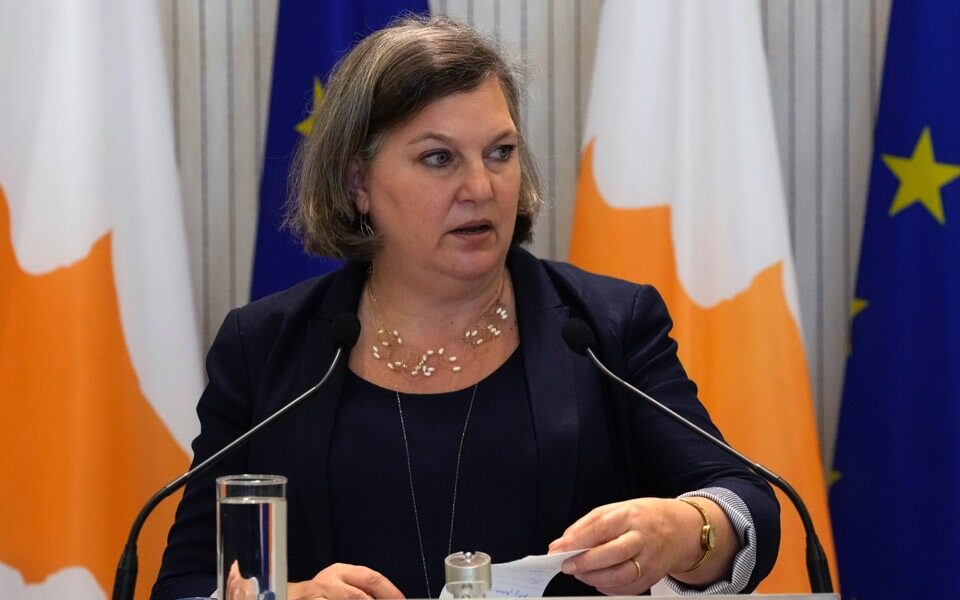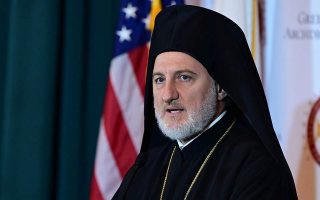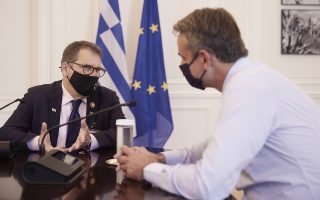AHI concerned by ‘contradictory messaging’ from US official on East Med

The American Hellenic Institute (AHI) has issued a statement expressing its “deep concern” with the “contradictory messaging” conveyed by a senior US Department of State official on Administration policy in the Eastern Mediterranean.
The statement was referring to last week’s visits to France, Turkey, Greece, Cyprus and Germany by Under Secretary for Political Affairs Victoria Nuland, who met with officials to discuss “regional security, economic issues, and bilateral priorities.”
The AHI pointed in particular to comments made by Nuland during her visit to Turkey, where she expressed support for energy projects, including pipelines, as a means of reducing Europe dependence on Russian gas. “There are many different opportunities in the Eastern Mediterranean, some of which will involve your immediate neighbors, new gas discoveries and new pipelines will need to be made,” she had said. However, during her ensuing trip to Cyprus Nuland stressed that the US’ view on an Eastern Mediterranean pipeline is that it is “not economically viable and would take too long.”
Her comment prompted a reaction from Greek Foreign Minister Nikos Dendias, who countered that “the EastMed [pipeline] is alive and kicking.”
“Energy cooperation is a critical component of the “3+1” mechanism between Greece, Cyprus, Israel, and the United States. However, it must not be up to one of the parties, the United States, to impose its own energy policy upon the parties, but rather, it should be up to the parties to arrive at an energy policy that best serves their collective interest. Under Secretary Nuland’s contradictory messaging on Eastern Mediterranean pipeline projects, indicating her support and subsequent skepticism of such projects within the same week, is confusing and unhelpful. It gives the appearance of appeasement of Turkey,” AHI President Nick Larigakis said in Monday’s statement.
The AHI also took issue with Nuland’s comments to the press while in Cyprus, where she referred to the leader of the Turkish-occupied north of the island, Ersin Tatar, as “President Tatar,” during the inauguration of the Cyprus Center for Land, Open-seas, and Port Security (CyCLOPS) with Cyprus foreign minister Ioannis Kasoulides.
“We appreciate Under Secretary Nuland’s visit to the new CyCLOPS center, a recognition that Cyprus is an important strategic partner. However, Under Secretary Nuland undercut her efforts by referring to Ersin Tatar as ‘President,’ contradicting the policy of the State Department itself, as the United States does not recognize the so-called ‘Turkish Republic of Northern Cyprus.’ As Under Secretary Nuland is aware, words have consequences, especially in sensitive areas of the world. Her misstatement is completely unacceptable and needs to be immediately rectified,” noted Larigakis.
The AHI also noted statements made by Nuland indicating that the US is in favor of the recent rapprochement between Turkey and Israel, and supports Turkey’s inclusion in regional East Med energy projects.
“For Under Secretary Nuland to dictate to Greece, Cyprus, Egypt and Israel – who are leading the efforts on regional energy cooperation – that they must ‘involve’ Turkey on energy matters is absurd. Turkey constantly engages in provocations against Greece, does not recognize the Republic of Cyprus, funds terrorism against Israel and is hostile to the current government of Egypt. The Turkish government needs to completely change its behavior for regional countries to even consider its inclusion in regional energy projects. Under Secretary Nuland’s comments either reflect a desire to appease Turkey, or a complete lack of understanding of regional realities,” said Larigakis.
In an interview with a Turkish newspaper, meanwhile, Nuland hailed Turkey’s “pivotal role” as “a stalwart defender of Ukraine’s sovereignty and territorial integrity” in the wake of Russia’s invasion of the eastern European country.
According to Larigakis, “such a statement demonstrates a complete double standard, given Turkey’s invasion and occupation of Cyprus, as well as Turkey’s broader ambitions to establish itself as a hegemon in North Africa, the Middle East, and Eastern Mediterranean, as openly noted by Turkey’s ‘Blue Homeland’ doctrine.”





